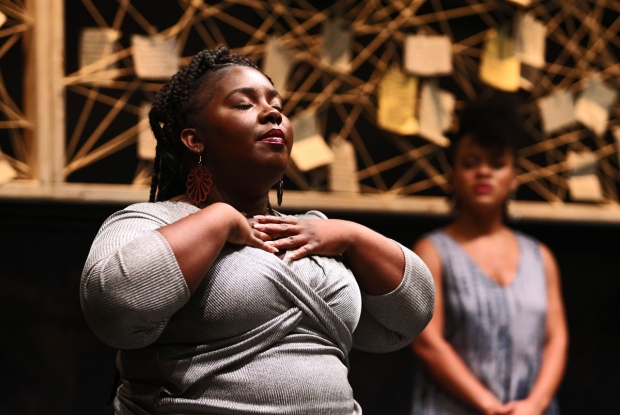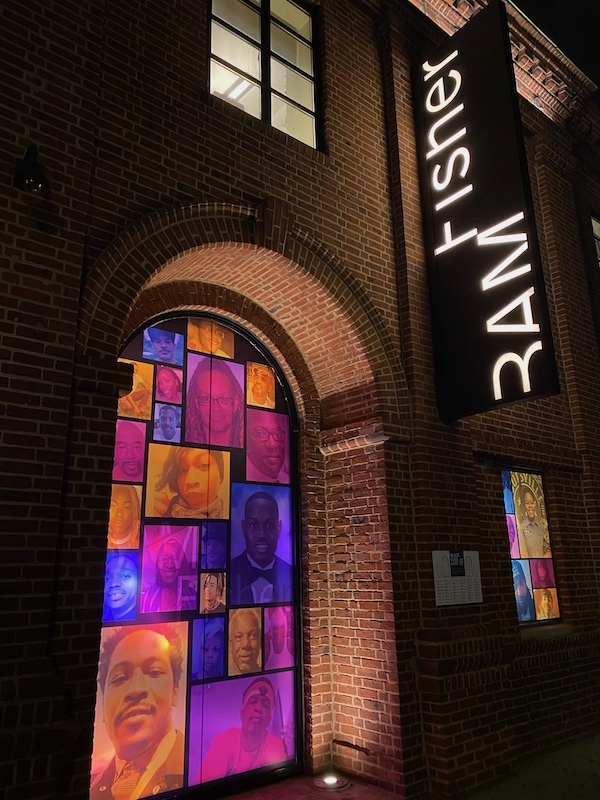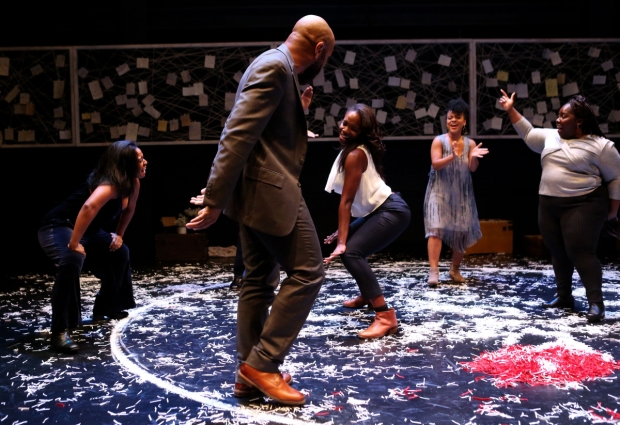Review: What to Send Up When It Goes Down Both Grounds and Uplifts
Aleshea Harris’s drama, directed by Whitney White, reopens at Brooklyn Academy of Music.

What to Send Up When It Goes Down
(© Donna Ward)
In the lobby of Brooklyn Academy of Music's Fisher Theater, Aleshea Harris, playwright of What to Send Up When It Goes Down, briefly spoke with me. She said quietly, "I hope this play gives you something." Her eyes delivered a stern yet optimistic message, and her smile was hidden behind a medical face mask, since we are still in the middle of a global pandemic.
As a Black woman, I have witnessed the look Harris gave me many times before. It is part of a special coded language that only Black people can understand. I immediately translated Harris's "something" to mean healing or a subtle light at the end of the darkness. My friends are constantly searching for that light in a society that actively oppresses us and strategically makes us feel invisible. Harris has repeatedly mentioned that while everyone is welcome to experience her play, she wrote What To Send Up When It Goes Down specifically for Black people who have endured and struggled within a system of white supremacy, while making significant contributions to every segment of American society.
What to Send Up When it Goes Down is a brilliant expedition that doesn't just begin with this production of Harris's play, impeccably directed by Whitney White, or the many productions that came before. One might consider that the journey begins with the overall Black experience. After all, to truly benefit abundantly from this show you have to be Black. While not monolithic, the Black experience often includes pride and self-made riches, which are rarely discussed, alongside the overly produced depictions of pain, struggle, and premature death.

(© Ayanna Prescod)
All attendees are asked to begin by remembering those that have passed on. The voyage commences with Black Lives Lost, an installation scattered throughout BAM's front façade and into the theater's basement lobby. The many portraits of Black people who lost their lives to anti-Black violence are filtered with hues of reds, blues, and yellows, and leads to somber moments of grief and reflection. There are dozens of photos, yet not every Black body was included for the consideration of space. Including everyone would undoubtedly take over the entire theater and pour into neighboring buildings. However, among the faces prominently displayed are Elijah McClain, Daunte Wright, Breonna Taylor, Tony McDade, and George Floyd—all of whom were murdered by the hands of police in just the past year.
After sitting with these images for a bit, a Black woman, who the program identifies as "Four" (Kalyne Coleman), addresses the audience with a prologue that reaffirms that "this ritual is first and foremost for Black people…this piece was created and is expressed with Black folks in mind" (While the Saturday evening audience was diverse in race, the majority of patrons appeared to be Black).
The show, framed as a healing ritual, begins with full audience participation. Four asks a series of questions like, "Have you been denied a promotion, or proper medical care because you are Black," and the collective yes response among Black patrons, served as constant reminders of the of the deep roots of systematic racism. When the audience is finally asked to find a seat, as every ticket is offered as general admission, I couldn't help but notice that white and other non-Black people of color, consciously or unconsciously, took up the majority of the first row. Even after being reminded of who this space was created for, Black people were not given the opportunity to sit unobstructed by a non-Black person that evening. Ironically, this became part of the evening's theatrical scenery, reflecting the societal privilege that often benefits non-Black people.
Yu-Hsuan Chen's set design offers a minimal, yet sufficient, immersive experience. Hand written notes, later discovered to be positive letters of affirmation for Black people, hang on white strings on the walls, and add light to the otherwise dark black box theater. In the center of the theater is a chalked circle, and inside the circle are gray and white pails in various sizes, holding pens, blanks sheets of paper, and other writing materials. Perfectly spaced, socially distanced seats, referred to as pods, are scattered in a semi-circle around the theater. The cast of seven accomplished Black artists — Alana Raquel Bowers (Three), Rachel Christopher (One/Made), Ugo Chukwu (Six/Miss), Denise Manning (Eight/Song Leader), Javon Q. Minter (Seven), Beau Thom (Five/Man/Driver), and Coleman — serve as both audience member and performer.
Through a series of masterful vignettes, precise movement, cultural dance, and glorious song lead by supreme vocalist Manning, Black participants are encouraged to reclaim their personal power by confronting and examining beliefs and practices associated with racism and racial bias. During the experience, there were sobs of agony, screams in anger, and later proclamations of victory and collective joy. What is meant to disrupt the pervasiveness of anti-Blackness and acknowledge the resilience of Black people hits the mark without sweeping the dirt under the rug. What to Send Up When It Goes Down gave me that "something," and my hope is that everyone else left with it too.
What to Send Up When It Goes Down is presented by BAM and Playwrights Horizons, in association with the Movement Theatre Company. The co-production will also have a staging at Playwrights Horizons in the fall.

(© Donna Ward)











